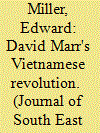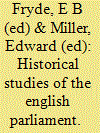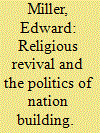|
|
|
Sort Order |
|
|
|
Items / Page
|
|
|
|
|
|
|
| Srl | Item |
| 1 |
ID:
151660


|
|
|
|
|
| Summary/Abstract |
During the fall of 1962, the American war correspondent Richard Tregaskis spent three months in South Vietnam. In Vietnam diary, published the following year, Tregaskis offered vivid descriptions of his experiences, which included joining South Vietnamese army troops on combat missions against ‘Viet Cong’ fighters, as well as observing an election inside one of the Saigon government's newly built ‘strategic hamlets’. But the main purpose of Vietnam diary was to detail the author's many encounters with Americans in South Vietnam — specifically the US soldiers, marines, and other military personnel serving as advisers to the South Vietnamese Army. Tregaskis greatly admired these Americans, whom he portrayed as indomitable Cold Warriors. He was particularly impressed with Lieutenant Dave Marr, a Marine intelligence officer he met at a US base in the city of Da Nang. Lt Marr, whom Tregaskis described as a ‘slim blond youth’ from California, spoke excellent Vietnamese, thanks to a year of intensive language training. He also displayed a marked ‘enthusiasm for things Vietnamese’. Tregaskis noted that Marr was rather less optimistic than many of his peers about the prospects for success against the communist enemy. ‘The best you can say is that we're holding our own,’ the marine told the journalist.
|
|
|
|
|
|
|
|
|
|
|
|
|
|
|
|
| 2 |
ID:
024192


|
|
|
|
|
| Publication |
Cambridge, University Press, 1970.
|
| Description |
xiii, 350p.
|
| Contents |
Volume 2 1399-1603
|
|
|
|
|
|
|
|
|
|
|
|
Copies: C:1/I:0,R:0,Q:0
Circulation
| Accession# | Call# | Current Location | Status | Policy | Location |
| 007924 | 328.30941/FRY 007924 | Main | On Shelf | General | |
|
|
|
|
| 3 |
ID:
036679


|
|
|
|
|
| Edition |
Vol.1.
|
| Publication |
Cambridge, Cambridge University Press, 1970.
|
| Description |
xii, 387p.Pbk
|
| Standard Number |
521096103
|
|
|
|
|
|
|
|
|
|
|
|
Copies: C:1/I:0,R:0,Q:0
Circulation
| Accession# | Call# | Current Location | Status | Policy | Location |
| 007923 | 928.30941/FRY 007923 | Main | On Shelf | General | |
|
|
|
|
| 4 |
ID:
142713


|
|
|
|
|
| Summary/Abstract |
Scholars have portrayed the 1963 ‘Buddhist crisis’ in South Vietnam as a struggle for religious freedom, as a political conspiracy, or as a manifestation of ancient religious beliefs and practices. This paper, in contrast, argues that the crisis emerged from a clash of modernizing visions. The Buddhist-led protests that took place in South Vietnam in 1963 were linked to the Vietnamese Buddhist revival, a nationalist reform movement that began during the early twentieth century. The protests also reflected growing Buddhist anxieties about the Ngo Dinh Diem government's nation-building agenda for South Vietnam. By the time the crisis began, Buddhist leaders had concluded that this agenda (which Diem referred to as the ‘Personalist Revolution’) was incompatible with their plans to realize Vietnam's destiny as a ‘Buddhist nation’. In addition to reinterpreting the origins of the crisis, this paper examines how the course of events was shaped by the personalities and agendas of particular Buddhist and government leaders, and especially by fierce rivalries among members of Diem's family. These internal tensions help to explain the failure of attempts to end the crisis through negotiations, as well as Diem's decision to crush the movement by force in August 1963.
|
|
|
|
|
|
|
|
|
|
|
|
|
|
|
|
|
|
|
|
|